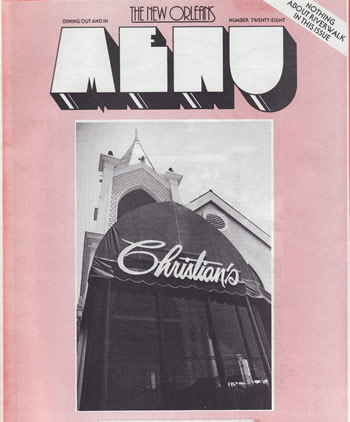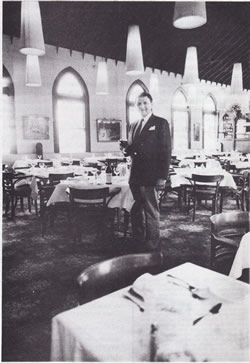
![]()
![]()
![]()
![]()
Christian's
Mid-City: 3835 Iberville.
1973-2005
Among Hurricane Katrina's restaurant victims, none is more lamented than Christian's. Beyond being a great place to dine and socialize, it was also unforgettable. I mean, really: a restaurant named Christian's in a former church? With family connections to Galatoire's, to boot? Its fame was inevitable.
As memorable as Christian's was, its early history is largely forgotten. Latter-day customers were surprised to learn that it originally opened in a nondescript, hidden building off Veterans Boulevard, near Bonnabel. The menu was the same as the one that became famous in the church a few years later, cooked by the same chef, and every bit as well.
Christian's never caught on in Metairie. It suffered an effect familiar to other suburban restaurant operators. If a Metairie or West Bank or North Shore restaurant serves exactly the same food in exactly the same environment as a restaurant Uptown or in the French Quarter, it will be expected to charge something like a third less for it. And people wouldn't dress up to go there. After all, it was "only in Metairie."
 There never was any question about the restaurant's credentials. Christian Ansel was the grandson of Jean Galatoire, founder of that vaunted local culinary dynasty. Chris (I never heard anyone call him Christian) was one of the managers of Galatoire's for years, even though his real profession was as an engineer.
There never was any question about the restaurant's credentials. Christian Ansel was the grandson of Jean Galatoire, founder of that vaunted local culinary dynasty. Chris (I never heard anyone call him Christian) was one of the managers of Galatoire's for years, even though his real profession was as an engineer.
Chris tried to push Galatoire's forward a bit. He met with stony resistance from older family members. He decided that the future as he saw it would not come anytime soon at Galatoire's. He left the family business and opened his own restaurant, in partnership with fellow engineer Henry Bergeron.
In Christian's kitchen from the outset was Chef Roland Huet. He was from Pau, France--not far from the ancestral hometown of the Galatoire's. Roland had worked at Galatoire's, and understood perfectly where Chris was coming from.
Chef Roland was among the last of his breed of chefs. French cuisine was being modernized, and chefs who stayed with the classic Escoffier-era styles were disappearing. Chef Roland could cook anything, and did--even if a recipe took two days. He laid down a foundation of French-Creole dishes in the style of Galatoire's. Then he began inventing the dishes that made Christian's famous.
 At the center of his menu was one of those two-day recipes. When Christian's opened, no restaurant in New Orleans routinely made its own demi-glace--the classic reduction of veal stock to a near-jelly, the essence of beef flavor. In fact, almost nobody knew what demi-glace was. Roland used it as the base for a brilliant signature dish, filet mignon a la Bayou la Loutre. The filet was stuffed with oysters, and more oysters were poached in the intense demi-glace sauce. Oysters and beef are a rare but marvelous combination. No restaurant ever did it better than Christian's.
At the center of his menu was one of those two-day recipes. When Christian's opened, no restaurant in New Orleans routinely made its own demi-glace--the classic reduction of veal stock to a near-jelly, the essence of beef flavor. In fact, almost nobody knew what demi-glace was. Roland used it as the base for a brilliant signature dish, filet mignon a la Bayou la Loutre. The filet was stuffed with oysters, and more oysters were poached in the intense demi-glace sauce. Oysters and beef are a rare but marvelous combination. No restaurant ever did it better than Christian's.
Another of Chef Roland's dishes that will survive him (he died in 2009) was his smoked soft-shell crab. It took the chef months and four different kinds of smokers, but he finally developed a method. He put live soft-shell crabs into a cold smoker for about fifteen minutes. They would come out smoked, but still alive. Then he'd fry them and serve them with a Galatoire's-style brown butter. They were so delicious and light that you inhaled them.
The menu was riddled with other great and unique creations: oysters Roland (baked with mushrooms, bread crumbs, parsley and garlic), stuffed fish (rolled around a filling of rich, crabmeat-and-shrimp-riddled bechamel), braised veal sweetbreads with port and demi-glace, and veal with morel mushrooms.
As brilliant as all this was, Chris and Henry knew Metairie wasn't the place for it. They began looking for a new location. They found a small, vacant church in Mid-City. They took a look, got some opinions from architects, and worked out a price with the congregation (which had moved to bigger quarters).
"The big question was, could we get away with opening a restaurant named Christian's in a church, without offending a lot of people?" said Chris. "We decided to go for it. Nobody ever told us anything untoward."
That was probably because the church aspect was soft-peddled. Pews were turned into banquettes, and the pulpit became the maitre d's stand. But waitresses didn't dress in nuns' habits anything like that. How hard does one need to sell the concept in a place with a steeple above its entrance?
The new Christian's won architectural awards. And the customers were delighted. Tourists heard there was a must-try restaurant in a church and booked tables at Christian's before they knew where it was or what it served. All this, with the existing great cooking, turned Christian's into a tremendous success.
Maybe a little too tremendous. Reservations were hard to come by. The tables were jammed in the way they were at Galatoire's. Which is to say that you were practically in the lap of the person next to you. This was especially true in the pew-banquettes. For this and other issues, some people complained. The reviews were less than reverent. Chris and Henry reacted at one point by banning restaurant critics--myself included--from the restaurant for a few years.
They mellowed later. A number of tables were removed, and the restaurant became much more pleasant. Meanwhile, Chef Roland kept inventing his French-Creole food.
Christian's peaked just before the Uptown gourmet Creole bistros took over the dining scene. It began a long, slow decline--not in quality, but in volume. In the late 1990s, Chris Ansel retired and sold his half of Christian's to his partner Henry. Chris then became involved in Galatoire's again, behind the scenes. He was to a great extent the force behind the tremendous changes at Galatoire's at the turn of the century.
Hurricane Katrina did major flood damage to Christian's. Henry Bergeron--who by that time was in his seventies--was so depressed by the disaster that he never reopened the restaurant, even though he and his family don't consider Christian's dead. They did, however, sell the iconic building to a Baton Rouge seafood merchant, who has reopened the place as Redemption.
